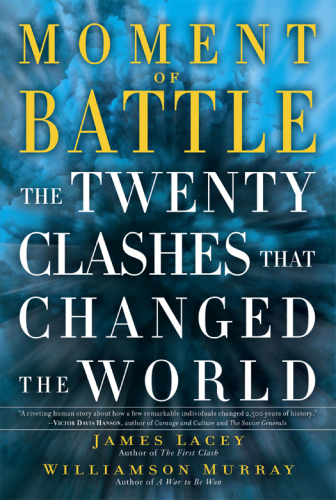
Moment of Battle
The Twenty Clashes That Changed the World
کتاب های مرتبط
- اطلاعات
- نقد و بررسی
- دیدگاه کاربران
نقد و بررسی

February 4, 2013
In this modern version of Sir Edward Creasy’s The Fifteen Decisive Battles of the World (1851), defense analysts and professors Lacey and Murray lay out the long-term strategic and cultural consequences of 20 major battles. Ranging from antiquity to today, and from the well-known to the obscure, the battles of Marathon (490 B.C.E.), Yarmuk (636 C.E.), Vicksburg (1863), Kursk (1943), and Operation Iraqi Freedom’s Objective Peach (2003) all get their due. The authors deftly interweave combat summaries (supplemented with detailed maps) with discussions of strategy, and they defend their inclusion of lesser-known battles with convincing evidence—they credit “Swedish administrative reforms” during the Battle of Breitenfeld (1631) for paving the way for “the maintenance of large peacetime forces,” and attribute the ascendancy of Great Britain to two battles fought against France in 1759—“the year of miracles.” Commentary on the conflicts runs the gamut from pop culture asides (as when the authors liken a retreat to “the modus operandi of Monty Python’s knights: ‘Run away, run away...’ ”) to breathless praise for strategic acumen (“Grant’s campaign against Vicksburg was the foremost example of operational art”). Engaging, well written, and thoroughly researched, this book will appeal to amateur and professional historians alike. 50 b&w photos, 18-20 maps. Agent: Eric Lupfer, WME Entertainment.

May 1, 2013
How would the world be different if certain critical battles had gone the other way? Two top military historians offer answers. Institute of Defense Analyses consultants and lecturers Lacey (The First Clash: The Miraculous Greek Victory at Marathon and Its Impact on Western Civilization, 2011, etc.) and Murray (Strategic Challenges for Counterinsurgency and the Global War on Terrorism, 2012, etc.) are not interested in rehashing Agincourt, Waterloo or Gettysburg. Instead, they choose battles that, they write, made a decisive difference in history. Instead of close analysis of tactics, they look at what effect they had on creating our modern world. Most of their choices are hard to argue with: An Athenian loss to Persia at Marathon would likely have cut off what we think of as Greek civilization almost at its start. Likewise, it's hard to deny that modern European history would be vastly different without the Norman victory at Hastings. Some of the authors' other choices are more obscure; few except specialists are likely to know about Yarmuk, the first great victory of Muslim soldiers against Europeans. Breitenfeld, a battle of the Thirty Years War in which Gustavus Adolphus' new methods of military organization routed superior numbers under the banner of the Holy Roman Empire, may be even less familiar. Lacey and Murray sometimes take a contrarian tack--e.g., their argument that Benedict Arnold was the best American commander of the Revolutionary War. More often, the authors take a conventional view, praising Grant's generalship or criticizing the Allied commanders during the early stages of World War I. They also tend to criticize the decision-making of the losing generals, as in the Battle of Britain, where a German decision to stop bombing airfields allowed the RAF to continue the battle and eventually prevail. The final chapter, on the American victory in Iraq in 2003, predicts that it, too, will make a major historical difference, once its impact is fully known. Will open interesting doors for casual readers and provide plenty of debate fodder for military-history buffs.
COPYRIGHT(2013) Kirkus Reviews, ALL RIGHTS RESERVED.

July 1, 2013
Lacey (history, Johns Hopkins Univ.; The First Clash: The Miraculous Greek Victory at Marathon and Its Impact on Western Civilization) teams here with the esteemed Murray (history, emeritus, Ohio State Univ.; Hybrid Warfare: Fighting Complex Opponents from the Ancient World to the Present) in what serves as an update to Edward Shepherd Creasy's classic The Fifteen Decisive Battles of the World (1851). Some of the 20 battles covered here are obvious choices--Hastings, Trafalgar, and Midway, for example--but others less so--the seventh-century Battle of Yarmuk, the American Revolution's Battle of Saratoga, and Objective Peach (2003) on the way to reaching Baghdad in the Iraq War. Each battle has its own chapter in which the authors discuss the military situation and events surrounding the engagement. Analysis of the campaign and its long-term effects on history (e.g., Sweden's victory at the Battle of Breitenfeld during the Thirty Years' War kept Germany divided and prevented the Catholic Church from stifling the scientific revolution) concludes each chapter, but there is no broader conclusion at the end of the book. VERDICT More accessible than Creasy or J.F.C. Fuller's three-volume A Military History of the Western World but still informative and insightful. Anyone interested in military history will enjoy this title.--Matthew Wayman, Pennsylvania State Univ. Lib., Schuylkill Haven
Copyright 2013 Library Journal, LLC Used with permission.

May 15, 2013
Two distinguished military historians offer yet another (and undeniably successful) effort to update Sir Edward Creasy's classic, TheFifteen Decisive Battles of the World (1908). The 20 battles range from classical antiquity (Marathon) to the Second Iraqi War, and each battle (or as with Vicksburg, campaign) is placed in its historical context, with economic and social factors added as relevant. The criterion for decisivenessWould a different outcome have changed the world?seems to be reasonable, and the actual battle narratives have notes for scholars and clarity for lay readers. The focus is definitely on Western history, and not all of the minor details are quite right (e.g., Nelson's Victory did not have 50 32-pounders on each broadside), but literate narratives and balanced conclusions should attract a deservedly large readership.(Reprinted with permission of Booklist, copyright 2013, American Library Association.)

























دیدگاه کاربران